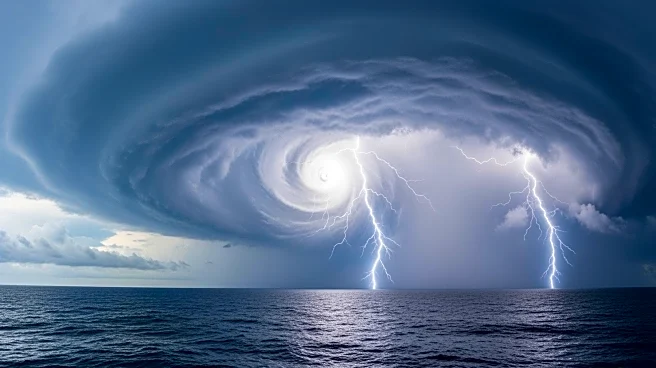What's Happening?
Tropical Storm Melissa is currently moving slowly in the Caribbean and is forecasted to intensify into a major hurricane by the weekend. The National Hurricane Center (NHC) has issued warnings for regions
including southern Haiti and eastern Jamaica, where the storm is expected to bring heavy rainfall, leading to catastrophic flash flooding and landslides. As of Friday afternoon, Melissa was located approximately 230 miles southeast of Kingston, Jamaica, with maximum sustained winds of 60 mph. The storm is moving east-southeast at 2 mph and is expected to strengthen rapidly, reaching Category 3 status by Sunday. Hurricane watches are in effect for the southwestern peninsula of Haiti and Jamaica, indicating possible hurricane conditions within the next 48 hours.
Why It's Important?
The intensification of Tropical Storm Melissa into a major hurricane poses significant risks to the Caribbean region, particularly in Haiti and Jamaica. The forecasted heavy rainfall and potential for catastrophic flooding and landslides could lead to severe damage to infrastructure, homes, and agriculture, impacting thousands of residents. The slow movement of the storm increases the uncertainty of its path and the potential for prolonged adverse weather conditions. This development is crucial as it highlights the vulnerability of Caribbean nations to natural disasters, emphasizing the need for effective emergency preparedness and response strategies to mitigate the impact on affected communities.
What's Next?
As Tropical Storm Melissa continues to intensify, emergency preparations are underway in the affected regions. The NHC has indicated that a hurricane warning may be issued for Jamaica later today, and residents are advised to monitor updates closely. The storm's path remains uncertain, with potential impacts extending to eastern Cuba by next week. Authorities in the Caribbean are likely to ramp up evacuation plans and resource allocation to ensure the safety of residents. The international community may also offer support in terms of disaster relief and recovery efforts, depending on the severity of the storm's impact.
Beyond the Headlines
The potential devastation from Tropical Storm Melissa underscores the broader challenges faced by Caribbean nations in dealing with climate-related disasters. The increasing frequency and intensity of such storms may be linked to climate change, necessitating a reevaluation of regional policies on disaster management and climate adaptation. Long-term strategies could include investing in resilient infrastructure, enhancing early warning systems, and fostering community-based disaster preparedness initiatives. These measures are vital to reducing the socio-economic impacts of future storms and ensuring sustainable development in vulnerable areas.









